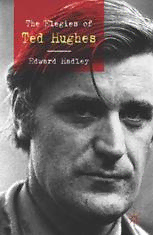
The Elegies of Ted Hughes PDF
Preview The Elegies of Ted Hughes
The Elegies of Ted Hughes This page intentionally left blank The Elegies of Ted Hughes Edward Hadley © Edward Hadley 2010 Softcover reprint of the hardcover 1st edition 2010 978-0-230-23218-1 All rights reserved. No reproduction, copy or transmission of this publication may be made without written permission. No portion of this publication may be reproduced, copied or transmitted save with written permission or in accordance with the provisions of the Copyright, Designs and Patents Act 1988, or under the terms of any licence permitting limited copying issued by the Copyright Licensing Agency, Saffron House, 6–10 Kirby Street, London EC1N 8TS. Any person who does any unauthorized act in relation to this publication may be liable to criminal prosecution and civil claims for damages. The author has asserted his right to be identified as the author of this work in accordance with the Copyright, Designs and Patents Act 1988. First published 2010 by PALGRAVE MACMILLAN Palgrave Macmillan in the UK is an imprint of Macmillan Publishers Limited, registered in England, company number785998, of Houndmills, Basingstoke, HampshireRG21 6XS. Palgrave Macmillan in the US is a division of St Martin’s Press LLC, 175 Fifth Avenue, New York, NY 10010. Palgrave Macmillan is the global academic imprint of the above companies and has companies and representatives throughout the world. Palgrave® and Macmillan® are registered trademarks in the United States, the United Kingdom, Europe and other countries. ISBN 978-1-349-31251-1 ISBN 978-0-230-28141-7 (eBook) DOI 10.1057/9780230281417 This book is printed on paper suitable for recycling and made from fully managed and sustained forest sources. Logging, pulping and manufacturing processes are expected to conform to the environmental regulations of the country of origin. A catalogue record for this book is available from the British Library. Library of Congress Cataloging-in-Publication Data Hadley, Edward, 1983– The elegies of Ted Hughes / Edward Hadley. p. cm. Includes bibliographical references and index. ISBN 978-1-349-31251-1 1. Hughes, Ted, 1930–1998–Criticism and interpretation. 2. Elegiac poetry, English–History and criticism. I. Title. PR6058.U37Z6959 2010 821’.914–dc22 2010002688 10 9 8 7 6 5 4 3 2 1 19 18 17 16 15 14 13 12 11 10 For my family and my friends This page intentionally left blank Contents Acknowledgements viii Introduction 1 1. Griefs for Dead Soldiers 15 2. Instinct for Loss 30 3. Singers of a Lost Kingdom 54 4. Moortown Elegies? 71 5. The Fruitful River 82 6. Dust As We Are 102 7. Nobody Else Remembers 121 Epilogue 144 Notes 156 Bibliography 170 Index 178 vii Acknowledgements The poetry of Ted Hughes (including ‘The swallow rebuilding’, ‘Atavist’ from ‘Three Poems for J.R.’, ‘Finale’ and ‘Six Young Men’) is reproduced by permission of Faber and Faber Ltd., Farrar Straus & Giroux and the Estate of Ted Hughes. Extracts from Peter M. Sacks’s The English Elegy: Studies in the Genre from Spenser to Yeats(pp. 18–20, 27, 33–4, 55–6, 85, 103, 114, 136, 148, 168) © 1985 are reprinted with permission of the Johns Hopkins University Press. For the effort, generosity and support which they have shown me in a variety of forms, I am indebted to the following: Daniel Bird, Carol Hughes, Paula Kennedy, Andrew Motion, Bernard O’Donaghue, Michael O’Neill, Gareth Reeves, Stephen Regan, Neil Roberts, Keith Sagar and Ann Skea. To all of you, my most sincere thanks. Finally, I would also like to thank my family and friends for enduring me through the highs and lows of my research and its transformation from a PhD thesis into my first book. Your unwaver- ing encouragement is most gratefully acknowledged. Introduction Whilst his poetry has been widely criticized for its apparent pre- occupation with violence and death, it is puzzling that the links these topics have in common with elegy have never been clearly verified in Ted Hughes’s poetry and have gone largely unnoticed in the diverse criticisms of his work. This might be because Hughes’s poems do not appear to bear the obvious elegiac characteristics frequently associated with traditional poetic laments; but closer scrutiny reveals not only acts of resistance, but also a great many similarities within the broad scope of elegy. Drawing on a ‘vital relationship with tradition’, he deftly invokes the generic properties of elegy without in any way fol- lowing them slavishly, creating ‘a dialogue with it both consciously and unconsciously’.1 It might be said that elegy is answering death, and that the work of the elegist is to reaffirm emotions, or rather, place bereavement and loss in a context appropriate to their skill, to expostulate grief in a manner befitting their medium. The elegy is there to preserve the dead as long as possible so they may co-exist with the living or be embalmed immortally in the print of the written word. Where Hughes does participate in the elegiac tradition, he draws on conventions that include ‘a procession of mourners, extended use of repetition and refrain, antiphony or competition between voices, appeals and ques- tionings of deities and witnesses, outbreaks of anger or criticism, offer- ings of tribute and rewards, and the use of imagery such as water, vegetation, sources of light, and emblems of sexual power drawn from the natural world depicted as either injured victim or site of renewal’.2 Many of these practices are rooted in a tradition that reaches certainly 1
